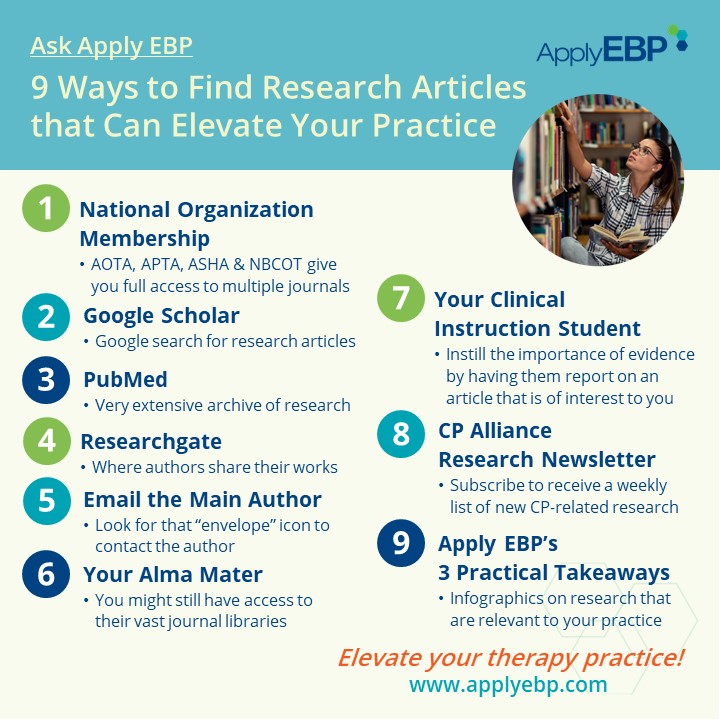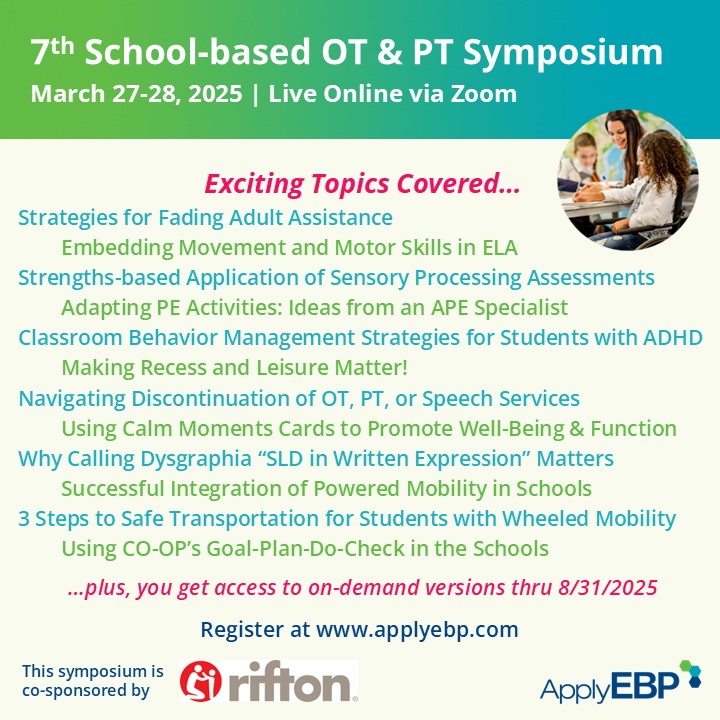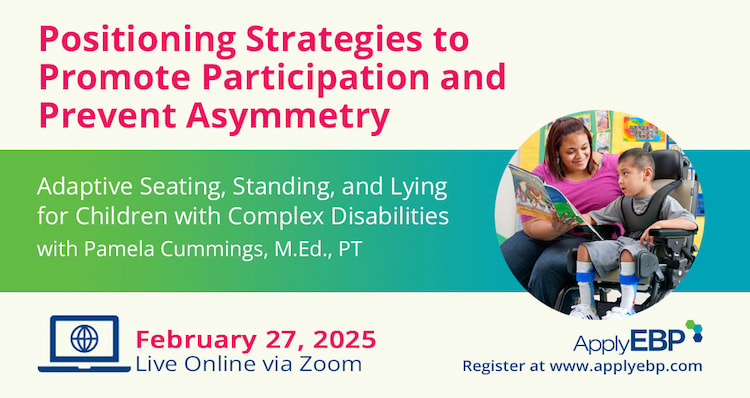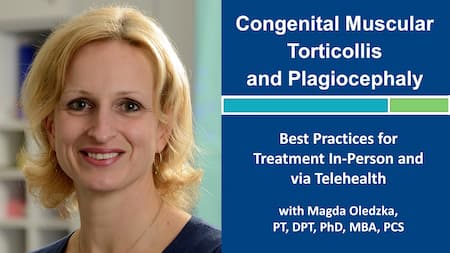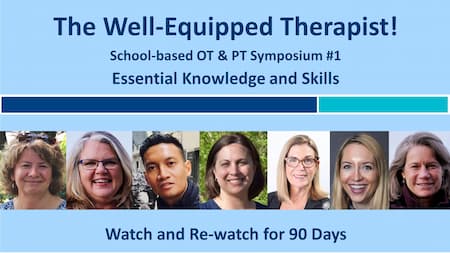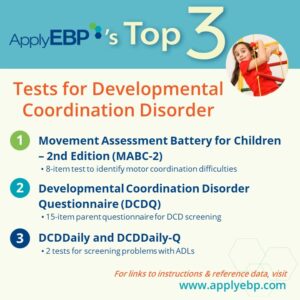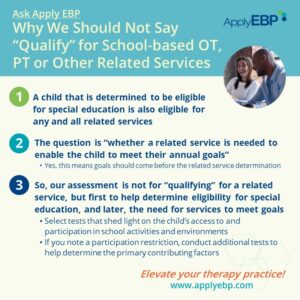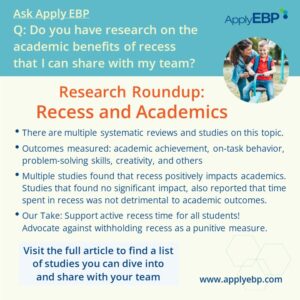Ask Apply EBP
9 Ways to Find Research Articles that Can Elevate Your Practice
Question: I would love to apply more evidence to my practice. What’s the best way to find relevant research articles?
In our Apply EBP courses, we do love talking about the latest evidence and how to apply them to elevate your practice. So, we are happy to share here some of our favorite ways to find research articles that are relevant to your practice. Here they are, in no particular order:
-
-
- Your National Organization: One benefit of joining your professional organization is that they include access to journal articles relevant to your practice.
-
-
- American Physical Therapy Association (APTA)
- Pediatric PT Journal
- For APTA Pediatric Section Member – Full access
- For non-members
- Full access to articles that are over 1 year old ⇐ This is amazing!!!
- Abstract access to articles that are less than 1 year old
- Physical Therapy Journal – APTA’s journal for all physical therapy topics
- PT Article Search
- APTA claims Article Search includes full-text access to more than 5,000 clinical and acadmemic publications. Anytime I think of justifying the cost of APTA membership, I always remind myself of this abundant resource.
- Pediatric PT Journal
- American Occupational Therapy Association (AOTA)
- American Journal of Occupational Therapy
- AOTA’s journal. In the year 2020 they started publishing multiple Systematic Reviews regarding to OT services for the pediatric population. Go to those right away
- External OT Journals: Your membership also gives you access to these 3:
- Australian Occupational Therapy Journal
- British Journal of Occupational Therapy
- Canadian Journal of Occupational Therapy
- American Journal of Occupational Therapy
- National Board for Certification in Occupational Therapy
- Includes Evidence-Based Resources via ProQuest and RefWorks
- American Speech and Hearing Association
- ASHAWire is the online home where you can find the journals and magazine listed below on one page. As a member, you get access to the full articles. As a nonmember, you can read abstracts. See what’s included below:
- The 4 ASHA journals:
- ASHA Journal of Audiology
- American Journal of Speech-Language Pathology
- Journal of Speech, Language and Hearing Research
- Language, Speech, and Hearing Services in Schools
- The ASHA Leader – newsmagazine with the latest news, research, and practice advances
- Perspectives of the ASHA Special Interest Groups – “scholarly review journal, focused on bridging the gap from research to practice and advancing knowledge translation in the field”
- The 4 ASHA journals:
- ASHAWire is the online home where you can find the journals and magazine listed below on one page. As a member, you get access to the full articles. As a nonmember, you can read abstracts. See what’s included below:
- American Physical Therapy Association (APTA)
-
-
- Google Scholar
-
-
- Google archives all research it can find. Just go to the link above and start searching. 2 pro tips:
- If you see “PDF” on the right side, that usually means that that is the full article. Click on that!
- If an interesting title says “‘X number’ Versions” underneath, click on that to see the different versions. Then select the one that says “PDF” on the right side.
- Google archives all research it can find. Just go to the link above and start searching. 2 pro tips:
-
-
- PubMed
-
-
- Another place that archives research. Very extensive (34 million + citations), like Google Scholar.
-
-
- Researchgate
-
-
- I often find authors who are members of Researchgate upload their full articles here. So it’s a good place to try if Google Scholar and PubMed only have abstracts.
-
-
- Email the Author of the Article
-
-
- When all you can find from Tips 1-5 above are abstracts, look for that “envelope” icon next to one of the authors’ names, and you will find their email address.
- Email the author and ask if they can share that article.
- Another pro tip: when you find something interesting in their research that they did not include in the published article, you can also ask the author for this. For example, I have asked and received from an author a more detailed table (by age) of the norms of a test they evaluated. I have also asked for the protocol authors have used for teaching the contents of the IEP to students.
-
-
- Your Alma Mater
-
-
- Often, your alma mater gives you access to research articles.
- For example, my alma mater for my MBA schooling, Baruch College, gives me access to research article, with a caveat – I have to go onsite to download the full article. I can search for the article on Baruch’s database from my home computer, read the abstract, list the ones I want to read more about, then I head to Baruch to download the Full Text PDFs. This works for me as I am a short subway ride away from Baruch.
-
-
- Your Clinical Instruction Student
-
-
- Are you a Clinical Instructor? Ask your Mentee to do a report on an article/topic you like. They have access to their school’s vast trove of research articles.
- You are killing 2 birds with one stone. Instilling the importance of research in your CI Student, while learning about the research you are interested in.
-
-
- CP Alliance Research Newsletter
-
-
- If you sign up for their newsletter, you will receive a weekly email with the most recently published articles related to cerebral palsy. Read the abstracts, then look for the full version (see #s 1-5 above) for the article you are interested in.
- Works well if you have clients with a diagnosis of CP.
-
-
- Apply EBP 3 Practical Takeaways
-
-
- Apply EBP took upon a project of creating “3 Practical Takeaways” infographics from noteworthy research articles that are relevant to our practice. Surely, there are more than 3 takeaways from each article. So, we hope to inspire you to:
- Read the source article and come up with your additional takeaways. Our post includes a link to the abstract or full text (if available) of the article we are reviewing.
- Download, save, print, and share the infographics to share with your peers.
- Here are 3 ways to get it:
- Subscribe to Apply EBP and receive the 3 Practical Takeaways via your email
- Follow the Apply EBP Facebook Page
- Join the Apply EBP Discussion Group for School-based OT and PT on Facebook – we post here when we have new #3PracticalTakeaways; and this is also a group for discussing evidence in our practice!
- Apply EBP took upon a project of creating “3 Practical Takeaways” infographics from noteworthy research articles that are relevant to our practice. Surely, there are more than 3 takeaways from each article. So, we hope to inspire you to:
-
-
- Your National Organization: One benefit of joining your professional organization is that they include access to journal articles relevant to your practice.
-
As a final note, attend continuing education courses that are informed by evidence. Look for ones that share with you how their content is supported by research articles that have been published in reputable peer-reviewed journals. As the instructor presents, mark the articles you want to read and use the tips above to find the full-text articles.
Be discriminating when most of the citations are from blogs, newspapers, magazines, and, sometimes, books. They may contain strategies that are based on opinion, rather than evidence. Expect more from the instructors, and ask them for peer-reviewed articles that support their teaching. We are all science practitioners, after all, and should expect the highest quality when it comes to our continuing education.
Happy searching, reading, and elevating your practice!
At Apply EBP, we do the heavy lifting of searching the evidence, and presenting them to you so you can be more effective in your practice. Here are just 3 example of our courses that are full of evidence:
Find More Answers to Your Questions in Our...
Featured School
Symposium
Featured Live
Workshop
Featured On-Demand
Webinar
CMT & Plagiocephaly 2: Treatment
Featured Webinar
Bundle
The Well-Equipped Therapist 1!
Have a question?
Submit here…
*Clicking submit will send your question directly to our email inbox. Your name and email will let us know that your submission is real (not spam). We will not include these in our posts, unless you tell us to include your name. Please read our privacy policy here.
All infographics and videos on www.applyebp.com are intellectual properties of Apply EBP, LLC
You may use the infographics and videos for free for any non-commercial, educational purposes. Please cite the source as “Apply EBP, LLC” and a link to the source article. If you plan to use any infographic or video for commercial purposes (i.e., for profit), please email Carlo@applyebp.com to obtain a written permission. Permission can be granted on a case-by-case basis.

